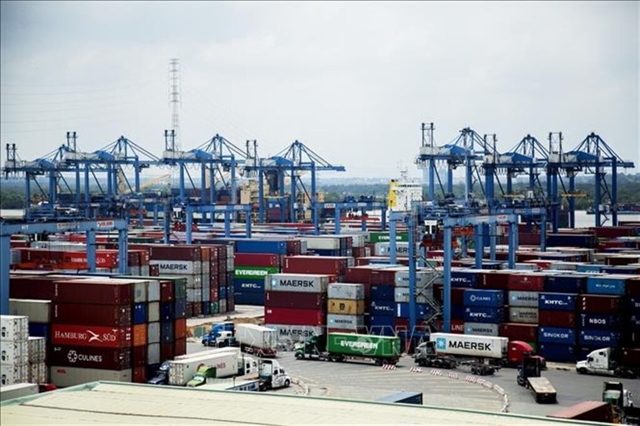 Economy
Economy


|
| A view of the Cát Lái Port in HCM City. VNA/VNS Photo |
HÀ NỘI Cargo firms have called on the Vietnam Maritime Administration to step up efforts in monitoring fees and surcharges collected by international shipping companies, which has been said to cut into their profit unfairly.
Phan Thông, secretary-general of the Vietnam Shippers Council (VNSC), said container handling service fees have increased by about 10 per cent since last month. In addition, many shipping companies have increased their terminal handling charges (THC) at ports, resulting in losses for Vietnamese cargo owners, who claimed the increases were not communicated clearly and fairly.
Phạm Quốc Long, vice-chairman of the Vietnam Shipowners' Association (VSA), said: "Terminal handling charges are a source of revenue for shipping lines, sometimes the main source because some shipping routes are highly competitive, and freight rates may be negative. Therefore, charges like THC, imbalance charges and fuel surcharges become the main revenue for shipping lines."
Long said according to international practices, THC fees are intended to allocate 80 per cent for port handling fees. However, in Việt Nam only 40 per cent of THC fees go to port operators
Lê Quang Trung, deputy director-general of the Vietnam Maritime Corporation (VIMC), said nearly all of Việt Nam's import-export cargo volume is transported by 10 international shipping companies. Trung said there are many reasons for shipping companies to increase their charges, including having to change routes due to heightened geopolitical tension in regions around the world.
He said communications regarding such an increase must be transparent and clear. He recommends the authority to hold such communications to the same standards set in Việt Nam's current laws and regulations, as well as international practices.
According to industry experts, Vietnamese cargo owners are often small, putting them in a disadvantaged position in negotiation with international shipping companies, which hurt them economically.
According to representatives of the Vietnam Ship Agents, Brokers, and Maritime Services Providers Association, international shipping companies have imposed 10 types of surcharges such as documentation fees, fuel surcharges, container sanitation fees, sulphur reduction fees, and container balance fees, among others. To make matters worse, the prices and types of surcharges were decided by themselves without negotiating with customers.
Lê Đỗ Mười, director of the Vietnam Maritime Administration, said fees and surcharges are determined by the market and shipping companies' operations. He advised them to conduct reviews and where applicable, make adjustments to support the rights and interests of cargo owners. Mười called on shipping companies to keep surcharges to the minimum to help protect the profitability of the entire shipping lines.
Meanwhile, according to the administration, the Vietnamese government has been working around the clock to find ways to reduce logistics costs. Increases in surcharges are considered counter-productive to the government's efforts.
"In the future, the administration will take measures to reconcile the related parties and address the difficulties and obstacles faced by businesses," Mười said.
In an earlier development, the Ministry of Transport proposed that surcharges on top of container shipping prices by sea should be declared in full, which has received initial support from the Ministry of Finance. VNS